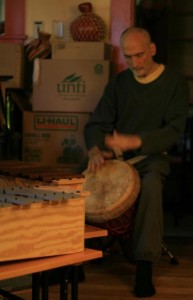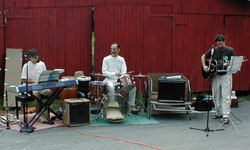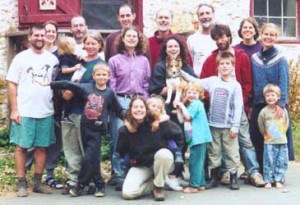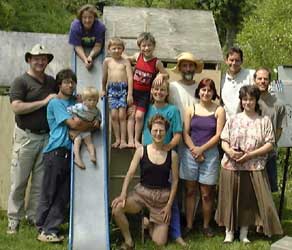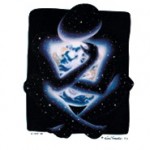Charles Curtiss: A Pause for All Symphonies in the Ether, Unwritten
He arrived home after a flood to find me, a stranger, on hands and knees in his garden. I was a visitor to Heathcote Community and I had been assigned work exchange: the task of picking up gravel that had washed into the main garden from the parking pad. Charles had been traveling and we hadn’t yet met. He was one of the community gardeners and he stood, taking in the damaged plantings with shock. I tried to imagine the love and effort and hours he had given to this garden, now washed away. But as I observed him being unable to speak for some time, I also wondered if he was just one of those intense, dramatic people who always played moments like this. I would have the next two decades to learn that he was not. We lived together in drama and boredom, work and play, love and loss. Today I learned that Charles is gone.
 Charles had been a professional musician, a drummer, in a band that had a record contract but didn’t get far. He’d studied at Berklee but left before finishing in his version of the typical rebellion/not fitting in story. In community, he made his music a gift to all by teaching World Music Drumming classes and accompanying our singalongs with his guitar.
Charles had been a professional musician, a drummer, in a band that had a record contract but didn’t get far. He’d studied at Berklee but left before finishing in his version of the typical rebellion/not fitting in story. In community, he made his music a gift to all by teaching World Music Drumming classes and accompanying our singalongs with his guitar.
Leaving the rock & roll life for a career in Montessori seemed to have given Charles a sense of balance and span. He cultivated his identity as a “Sensitive New Age Guy,” reading and discussing the latest pop philosophy book and stretching to acknowledge his privilege with humor and humility.
He often talked to me about Lisa, the child who had been in his life and gone. She was a partner’s daughter, and when that relationship ended, it was the loss of Lisa he mourned most.
Since we both wanted to have a child, we briefly did a dance, imagining having one together. But that is not a relationship we would have.
One thing he shared with Lisa, and then used as therapy when she was gone, was his obsession with trains, real and toy. He had constructed a model train set that ate up most of his apartment and discretionary income, once upon a time. Since my dad also built a sprawling train universe in my childhood basement, I understood train therapy and enjoyed Charles’ stories. To this day, when I see a train, I think of him.
But his time at Heathcote was filled with other therapies: gardening, cooking, ever-flowing meetings. Charles was a pilgrim on a search and he thrilled at including visitors, friends, kids and community mates in his explorations and gentle curiosity of what it means to be human, gendered, ethical, accountable, alive. He took to wearing the same simple clothing most of the time. It added to his persona that one ex-Heathcoter had labeled his “icky priest.” Even as he smiled at the characterization and repeated it in jest, he also worked to temper the ego that gets fed by the pilgrimage itself.
Charles was anti-shack. Our guerilla structures were energy inefficient and he felt we should comply with all local codes. The individual hippie shacks exposed the community to potential trouble. I personally didn’t want to live in a group house. When he decided to move into one of Heathcote’s empty shacks so he’d have room for his music studio, he was the first one to make jokes about his hyprocracy. But eventually the zoning trouble did come, and I did leave the community rather than live in a group house. I can’t say I believe he saw into our future, but I believe he wanted the community to be more secure.
His sense of security was fed by a strongly independent, “bootstraps” streak. He didn’t want to burden his friends or the community. So, as he lived with Parkinson’s and his life shrank into the Farmhouse, decisions about what he could and couldn’t do, and what help he would ask for, were difficult for him. He was always clear with us that he would leave to be with his family in the end.
It was Charles, in his confrontational honesty, who helped me understand that my community and my friends there had turned in a direction I couldn’t follow, or, even if I had done the turning, it was time to part.
 As I page through our years at Heathcote in my mind, I light on our interactions, his judgements of me, his struggling with his judgements of me, my pulling back from our friendship when he got sick with Parkinson’s because I felt it was all I could do to badly take care of myself. And, because I have been a Heathcoter, I notice how much of my memories of us appear in a frame about me. Now I want to take the time to look at Charles—always setting aside funds for his next car; taking time to draw out a visitor’s life story; attending every monthly work day; mediating countless checkins with presence and gravity; taking constant public account of his life lessons and failings. He was a pilgrim for our times.
As I page through our years at Heathcote in my mind, I light on our interactions, his judgements of me, his struggling with his judgements of me, my pulling back from our friendship when he got sick with Parkinson’s because I felt it was all I could do to badly take care of myself. And, because I have been a Heathcoter, I notice how much of my memories of us appear in a frame about me. Now I want to take the time to look at Charles—always setting aside funds for his next car; taking time to draw out a visitor’s life story; attending every monthly work day; mediating countless checkins with presence and gravity; taking constant public account of his life lessons and failings. He was a pilgrim for our times.
—Wren
P.S. Charles appeared by name at least twice in my poetry. I like that these show the pilgrim I knew:
Broom Zen
Charles’ mother is dying.
He has planed
800 miles.
Now he sweeps
her kitchen.
Back home this is his
after-dinner chore.
He sweeps the hall,
2 seconds per stroke
by the mantle clock.
“Get the stairs while
You’re at it,”
his father says.
He sweeps the living room
and the porch.
He sweeps the lawn.
His mother is awake.
She asks of his plans.
He talks of job changes.
She takes out 3 papers
and crunches numbers
on the first.
Charles makes
clarifying calculations
on the second.
She rests.
And Charles waltzes the broom.
He spreads out the pages–
her handwriting, his;
the choreography of cursive.
And one more…
He takes the unused page,
with a pause for
all symphonies in the ether,
unwritten,
and drags his dustpile
onto the page
with his mother’s broom.
—WT
walking meditation
the walking meditation class is poised
watching pumpkins swell
watching crow’s feet creep
time lapsed
photography
to chronicle
an epic
of an
opening orchid…
a sunset…
high tide…
or charles remembering that
if you walk slowly enough
you need only stand still
—WT
Subscribe to this blog's RSS feed
